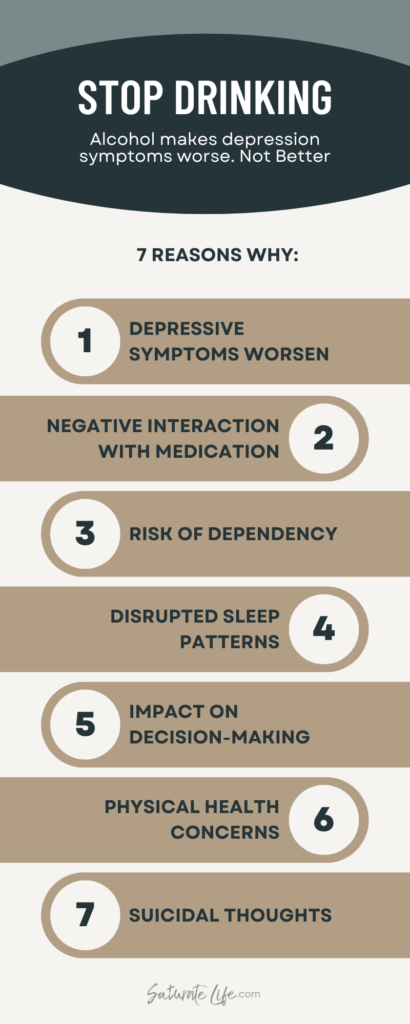Alcohol is not beneficial to those with depression. A drink might sound like a solution to a downer day but it’s not. Here are 7 reasons why alcohol is not beneficial to symptoms of depression.
Please note: I’m not a doctor, but alcohol can potentially affect depression due to its depressing effects on the nervous system. If you’re concerned about the impact of alcohol on your depression, it’s advisable to consult a healthcare professional for personalized advice.
1) Depressive Symptoms Worsening
Alcohol is a depressant, meaning it can slow down the central nervous system and lead to feelings of sadness and lethargy. For people with depression, alcohol can exacerbate depressive symptoms, including low mood, hopelessness, and sadness.
2) Negative Interactions with Medication
Many individuals with depression take medication to manage their condition. Alcohol can interact with these medications, reducing their effectiveness or causing adverse side effects. It’s important to consult with a healthcare provider about the potential interactions between alcohol and specific medications.

3) Risk of Dependency
People with depression may be more vulnerable to developing alcohol use disorders (AUD) because they may use alcohol as a way to self-medicate or cope with their symptoms. Over time, this can lead to dependence, making it even more challenging to manage both conditions.
4) Disrupted Sleep Patterns
Alcohol can disrupt the natural sleep cycle. While it may initially make you feel drowsy and help you fall asleep faster, it can lead to fragmented and disrupted sleep throughout the night. This means you’re more likely to wake up frequently and have trouble maintaining deep, restorative sleep.

5) Impact on Decision-making
Alcohol impairs judgment and decision-making abilities. Individuals with depression may already struggle with negative thought patterns and poor decision-making due to their condition. Adding alcohol into the mix can lead to risky behaviors and poor choices that can have serious consequences.
6) Physical Health Concerns
Excessive alcohol use can have detrimental effects on physical health, including liver damage, cardiovascular problems, and an increased risk of various cancers. Poor physical health can further contribute to feelings of hopelessness and exacerbate depression.
7) Suicidal Thoughts
Alcohol can increase the risk of suicidal thoughts and behaviors, especially in individuals with depression. It can lower inhibitions and impair rational thinking, making it more difficult for someone to make safe decisions during moments of crisis.
Non-alcoholic beers and mocktails exist for a reason. Try them out.
Rachel McG



